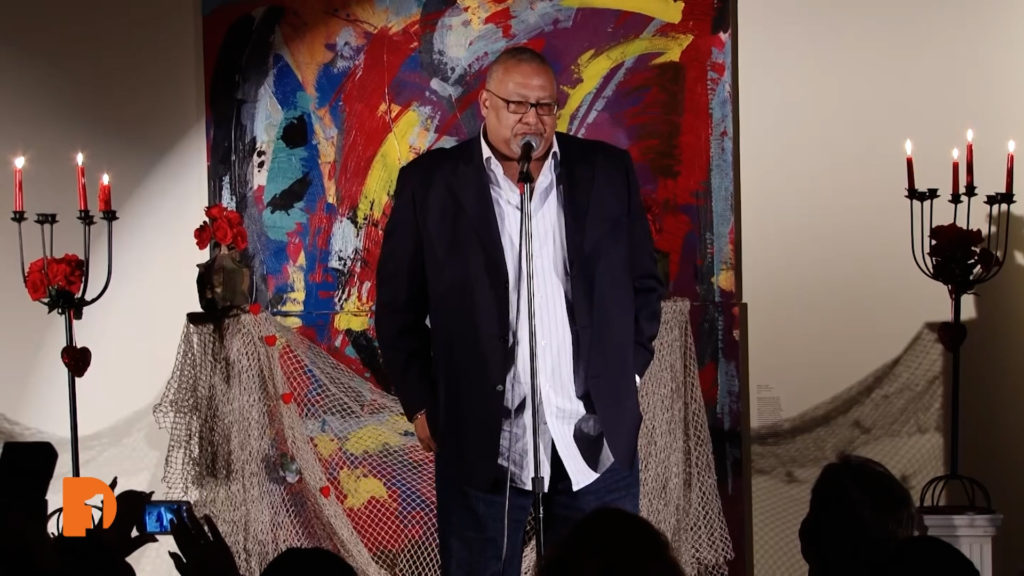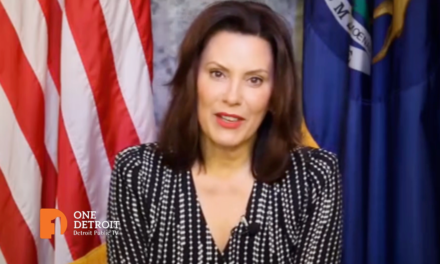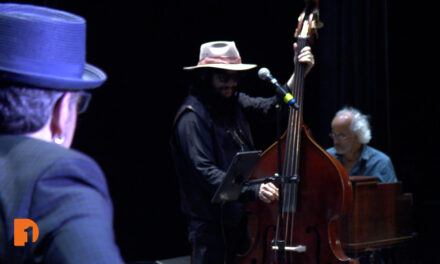History gets passed on and remembered through storytelling. The Secret Society of Twisted Storytellers is kicking off its 10th season with a special slate of storytellers in celebration of Black History Month. The event is hosted in partnership with Southfield Parks & Recreation and runs from 6-9 p.m. Feb. 17 at the Southfield Pavilion.
RELATED: Satori Shakoor: The power of telling stories of protest and pandemic
The event begins with a “pre-glow meet and greet” with featured storytellers Jill Chenault, Dr. Mayowa Lisa Reynolds, Rev. Horace L. Sheffield III and Yusef Shakur, as well as the Storyteller’s Marketplace where local vendors will be selling art, jewelry, books, clothing and more. The storytelling performances begin at 7 p.m., followed by performances from R&B singer Maurissa Rose and Body Rhythm Dance Theatre.

Rev. Horace Sheffield III shares his story during a Secret Society of Twisted Storytellers event. | Photo by One Detroit
Event host and One Detroit contributor Satori Shakoor sat down with City of Southfield Parks & Rec Office Supervisor Taneisha Springer to learn more about the Black History Month event and its theme, “CRT: Betrayal and Trust.” Plus, Shakoor talks with two of the performing storytellers, Rev. Sheffield III and Shakur, about the messages behind the stories they’ll be sharing.
Full Transcript:
Satori Shakoor, @satori_10: [Stage performance] So, our first storyteller, I ask in one sentence, What does black history mean to you?
“The Secret Society of Twisted Storytellers” has been partnering with the city of Southfield Parks and Rec for about four or five years. What are the ranges of the stories?
Taneisha Springer, Officer Supervisor, City of Southfield Parks and Rec: Every year the themes are different. This year is trust and betrayal. You know, black history is a lot of things. It’s a lot of things. So when you come, you’re going to come and you’re going to hear something about maybe a topic you hadn’t even thought about or may not have correlated with black history.
Satori Shakoor: And the storytellers are telling true personal stories.
Taneisha Springer: Yes. They tell their own personal stories. They’re funny, and sometimes they’re sad, but they are from the heart. And they touch your heart. And sometimes you can hear the story and it might make you think about something that happened in your family, in your past, or even in your present. The stories are always amazing.
Yusef Bunchy Shakur, Social Activist, and Story Teller, The Secret Society of Twisted Storytellers: [Stage performance] My mother realized from that day that I was possibly going to get killed or kill someone, and she made a decision only a mother would make. She made me a ward of the state. And I remember asking her “Why, Mama!?” And she replied simply to save you from yourself, my son.
Satori Shakoor: What does it mean for you to have a platform to tell your story at The Secret Society of Twisted Storytellers?
Yusef Bunchy Shakur: I’ve been doing this for over 20-something years, right? I don’t come out of a traditional place. Actually, I recognize myself as an unorthodox person, right? I’ve taught myself, I’ve been self-taught and the opportunity to that process of a platform, such as a twisted story, what I know is, how you and your platform honor particularly black folks and black stories.
Rev. Horace Sheffield III, Social Activist, Pastor, & Storyteller, Secret Society of Twisted Storytellers: [Stage performance] They sat me down. They said, “Son, the only time in life you experience friction is if you’re moving. If you ain’t going nowhere, folk don’t mess with you.” So I went back and I gave them a piece of my mind, told them F-you, and got kicked out of school. My mom said, “What happened?” I said, “I gave them some friction.”
I tell a story every week. So, you know, effective forms of communication is a powerful thing. I mean, you think about Frederick Douglass, for example, in Cleveland in the 1800s. With 1,500 folks in a hall. Being able to command the attention of all 1,500 of those people. And I think we’ve always lauded and honored people who have great oratorical gifts. The question is, and that’s what I ask myself, even when I preach on Sunday as a consequence of what I’m saying, what do I want them to do? ,
Satori Shakoor: Yes.
Rev. Horace Sheffield III: You know?
Satori Shakoor: Move, touch, and inspire action?
Rev. Horace Sheffield III: What’s the behavior? What’s the action? And if I don’t know that, then I’m just getting up, taking them on a trail that leads to nowhere.
Satori Shakoor: People are going to just be bowled over by your story. Especially “Honoring Mother, Honoring Father”.
Yusef Bunchy Shakur: Well, my thesis is around the relationship between me and my mother. So my assertion is to overstand my oppression, I must overstand my mother’s oppression. Looking at the world through my mother’s lens. And I think one of my propositions is for black people to overstand our overall oppression is to overstand the oppression of black women and how that has impacted us. Well, when we talk about CRT, right, and the race dynamic, it matters. But then, there’s something else that I’ve been introduced to, which is called triple oppression, race, gender, and class.
And sometimes CRT doesn’t necessarily engage in that, right? And it comes out of our own lived experience. So, when I look at the lived experience of my mother, I see the beauty, I see the hope, I see the determination. Despite the presence of an anchor that’s trying to hold her down. And I mean, if we think about all our families, unfortunately, we come out of poverty, but as if poverty is our fault. Poverty is the fault of the society, the power dynamic. But then, our mothers make the best of it. You know, that food that ain’t too much in the refrigerator, right? But she go up there and whipped something together.
Satori Shakoor: Mayonnaise sandwich.
Yusef Bunchy Shakur: You know, but it’s that love. It’s that hope. And she may go to bed and didn’t eat. My being is a result of those sacrifices. Our being is a result of those sacrifices. So, why I can’t honor my mother? Why I can’t honor our women? Because, again, I think that’s the missing piece in the CRT.
Rev. Horace Sheffield III: [Stage performance] So, that was love number two. And again, in Perfect Love, you know, was met with imperfection.
I want to really talk about how we locate who we are within ourselves, as opposed to all the social adjustments that are made on a regular basis. Jim Crow, Slavery, there’s going to always be something not just based on race, but even based on gender, based on zip code, that wants to relegate us to some subordinate position. How do we juxtapose our own disposition?
Yusef Bunchy Shakur: When you put the two individual stories in a narrative, it makes sense, like, Oh, this connects. And that’s what allows for the audience to relate and see themselves to now maybe want to tell their own story, but also just to feel empowered within the framework. And I think that’s what’s powerful about the dynamic of telling this during Black History Month.
Satori Shakoor: And when people come to the event and it’s February 17th at 7 p.m., kind of walk us through what they’ll experience when they first come in.
Taneisha Springer: They can come to the pre-glo, which starts at 6:30. And then, there are vendors there, black-owned businesses. We have a bar set up, they can have a drink, relax, talk, there’s a deejay playing a jam. So, you know, it’s a really nice ambiance. There are dance performers, you have their drummers there, vocalists along with the storytellers. So, you’re getting a really, really good show. I mean, this is really just a coming together of the arts.
Stay Connected:
Subscribe to One Detroit’s YouTube Channel & Don’t miss One Detroit Mondays and Thursdays at 7:30 p.m. on Detroit Public TV, WTVS-Channel 56.
Catch the daily conversations on our website, Facebook, Twitter @DPTVOneDetroit, and Instagram @One.Detroit
View Past Episodes >
Watch One Detroit every Monday and Thursday at 7:30 p.m. ET on Detroit Public TV on Detroit Public TV, WTVS-Channel 56.




